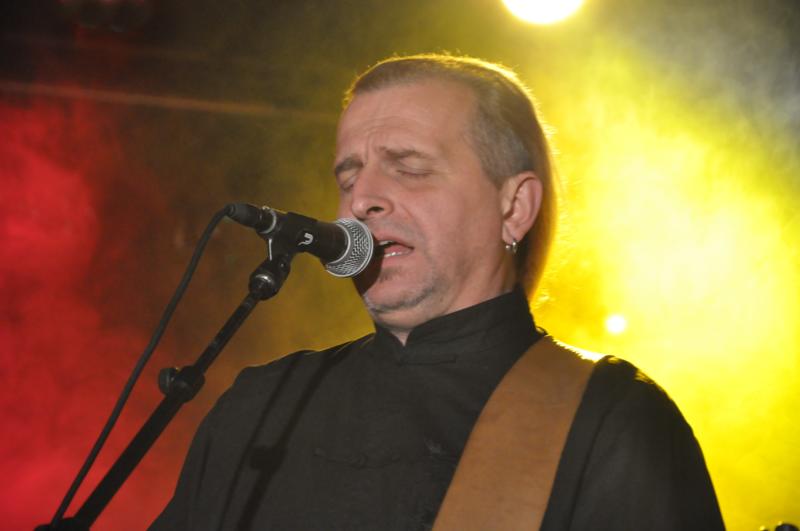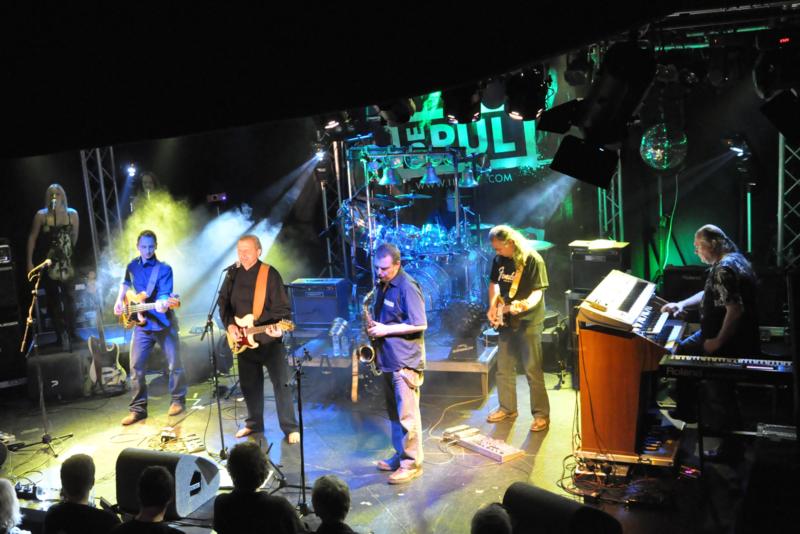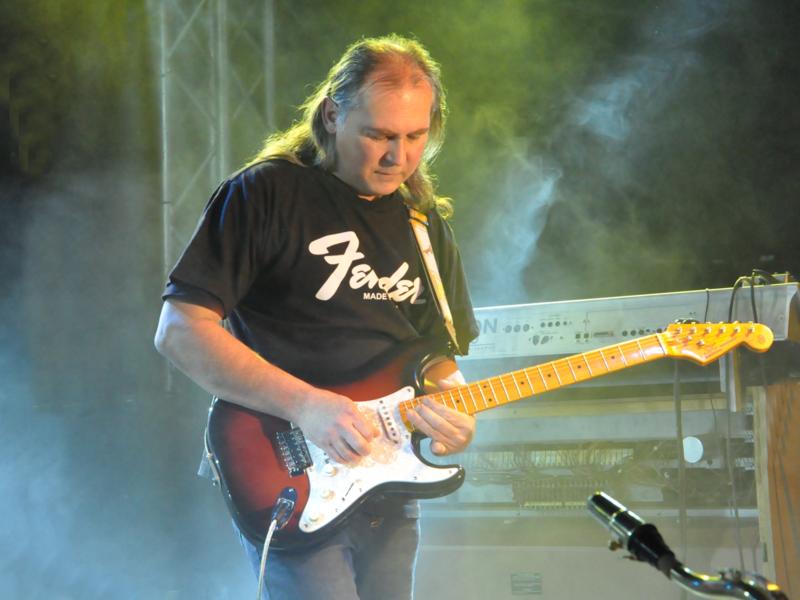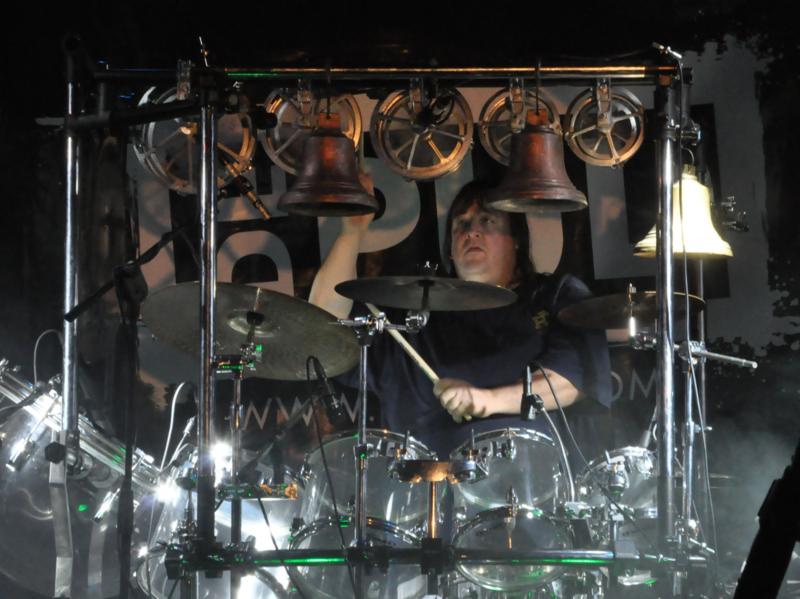Of all the bands from the early progressive rock scene, British
Pink Floyd has the most tribute
bands. In The Netherlands, we have
Pink Floyd Project,
Pink Project,
Pink Noise and
Steel Breeze.
The most famous Pink Floyd tribute band and probably the world’s best are
The Australian Pink Floyd Show.
The name of
The Hungarian Pink Floyd Show
sounds very much alike. In their home country, the band calls themselves
 Hitrock
Pink Floyd Tribute Band
Hitrock
Pink Floyd Tribute Band. They
gave four live shows in our country of which one of them was close
to my hometown. Thus, it was a perfect chance to find out whether they were as
good as the Aussies.
At the start of their performance, it was not immediately clear
which song would be the opener
of the concert. I heard some musical fragments from
The Wall,
but also some snippets from
Dark Side Of The Moon.
As soon as keyboardist
Tibor Füchsel
entered the stage and touched the keyboards, it became clear that
Shine On You Crazy Diamond
was the first musical delicacy on the menu. One by one, the
musicians hit the stage to perform their parts. Although they didn’t play the
entire piece, I enjoyed it a lot. Guitarist
László Birta came pretty close to the original sound of
David Gilmour.
Before we could enjoy a rather strong version of the almost entire
Dark Side Of The Moon
album, the band performed
Learning To Fly
from
A Momentary Lapse Of Reason sung by
György Gönczi.
In my opinion, he is not the perfect singer for
the band. His voice is not strong enough and his English had too much of an
accent.
The band performed
Dark Side Of The Moon
without the 'flying bed' song
On The Run,
but with the 'clock song'
Time.
Then the pianist played the first notes of
The Great Gig In The Sky and I asked myself how the two female

background singers would handle those difficult vocal parts. They both have
strong voices, but they couldn’t even stand in the shadow of the original
version by
Clare Torry. However, I
have to admit, it’s certainly not an easy song to sing.
Money got
the original Pink Floyd live version
- like many other songs in Uden - including the additional bass and guitar
parts. On
Us And Them,
the
saxophonist had a leading role and he managed to play his part in a proper way.
After
Us And Them, I expected
Any Colour You Like,
but to my surprise, they ended the medley with
Brain
Damage/Eclipse including the
well-known voice-over, originally recorded in the studio. According to the set
list this piece was the end of the first set but
One Of These Days, the first piece of the second set,
became the last of the first set, but without a pig at the ceiling…
Máté Nógrádi played a very strong
bass line and brought the audience in the right mood.
György Gönczi appeared
to be a very gifted lap steel guitarist.
After the break, we could enjoy a collection of songs from
The Division Bell.
They kicked off with a strong rendition of
Take It
Back followed by
Coming Back To Life
and
High Hopes. Just

like the original version, drummer
Tibor Poszsonyi
used the sound of a real bell, but
what surprised me most was the guy in the audience standing with his back
against the stage during the performance of
The Division Bell. As soon as the band started a short version of
The Wall,
he turned around with his face towards the musicians. He
apparently refused to listen to the songs recorded without
Roger Waters… The short version of
The Wall
included six tracks ending the second set.
For me, it was rather strange that the band played the tracks in random order. As
a result, the opening tune
In The Flesh
came after
Young Lust.
The only hit single from this magnificent album was also on the set list.
Another Brick In The Wall - part 2
started with the sound of a helicopter, just as on the original album and
just like Pink Floyd, they ended the set with
Comfortably Numb. Both
guitar players performed David Gilmour’s excellent guitar solo at the end of
this song. They both got the chance to show their skills. The lightshow
accompanying the guitar solos was fine, but that was not the case with the
solos themselves. Those solos should belong to the highlights of a Pink Floyd-tribute
but unfortunately, they didn’t.

During the encores, we got no surprises.
Wish You Were
Here and
Run Like Hell are the usual songs for Pink Floyd to
end with and the band stuck to this tradition. Actually, I would like to see a
different show from a tribute band, something the original band and other cover
bands don’t do. Why didn’t they play songs from the early days? Songs as
See Emily Play and
Arnold Layne
can be found on many compilation albums. The show also lacked material from
Animals or
Atom Heart Mother. Maybe
they´re afraid to be less successful if they include rather unknown tracks on
their set list. For a real Pink Floyd-adept it doesn´t matter what’s on the
menu as long as the songs are performed in the right way. The Hungarian Pink
Floyd Show are certainly not as good as The Australian Pink Floyd Show. That’s my
conclusion after seeing a band trying to entertain an audience the best
possible way without the use of additional stage props. In my opinion, the vocals
were the weakest part of the show. If they had been good, I wouldn´t have had
much to complain.
Henri Strik (edited by Peter Willemsen)